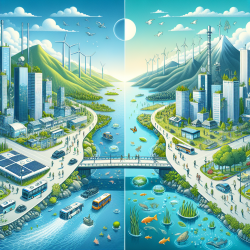Understanding the Coupling Coordination Between Urbanization and Water Ecology
As professionals dedicated to improving outcomes for children, it is vital to understand the broader environmental contexts that impact their futures. A recent study titled "Study on the Coupling Coordination between New-Type Urbanization and Water Ecological Environment and Its Driving Factors: Evidence from Jiangxi Province, China" provides valuable insights into the relationship between urbanization and water ecology, which could have significant implications for sustainable development.
Key Findings from Jiangxi Province
The study focused on 11 cities in Jiangxi Province, China, and examined the relationship between urbanization and the water ecological environment from 2009 to 2019. Here are some of the key findings:
- The level of new-type urbanization in Jiangxi Province showed a steady upward trend, while the water ecological environment level rose slowly, indicating room for improvement.
- Investment in scientific and technological innovation, the degree of opening-up, and government capacity positively correlated with the coupling coordination degree.
- Conversely, economic development level, resource agglomeration ability, education level, and industrialization level were negatively correlated with the coupling coordination degree.
Implications for Practitioners
Understanding these dynamics is crucial for practitioners who work with children in urban settings. The study suggests that balanced urbanization can foster a healthier ecological environment, which in turn supports better health and developmental outcomes for children. Practitioners can advocate for policies that promote sustainable urban development, ensuring that children's environments are conducive to their growth and well-being.
Encouraging Further Research
This study opens the door for further research into the specific impacts of urbanization on children's health and development. Practitioners are encouraged to explore how urban planning and ecological health intersect with educational and therapeutic outcomes. By integrating environmental considerations into practice, we can contribute to a holistic approach that supports children's development in a sustainable manner.
Conclusion
The coupling coordination between urbanization and water ecology is a critical factor in sustainable development. By understanding and applying these insights, practitioners can play a pivotal role in shaping environments that support the healthy development of children. For those interested in delving deeper into the research, the original study provides a comprehensive analysis and can be accessed here: Study on the Coupling Coordination between New-Type Urbanization and Water Ecological Environment and Its Driving Factors: Evidence from Jiangxi Province, China.










